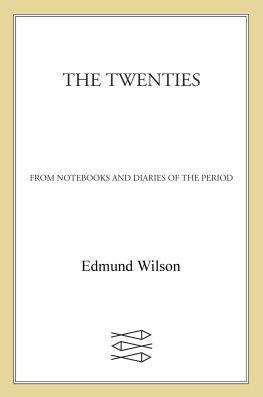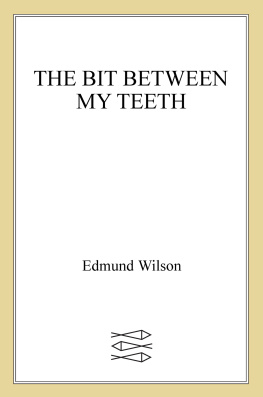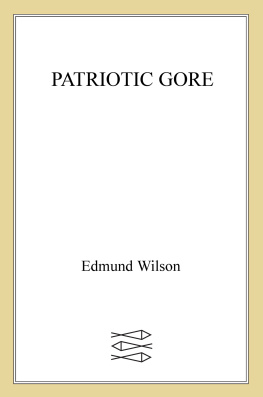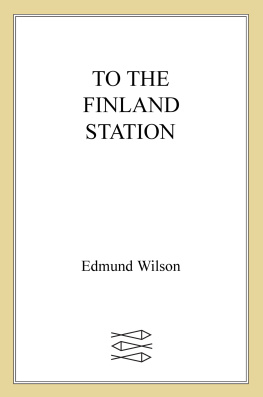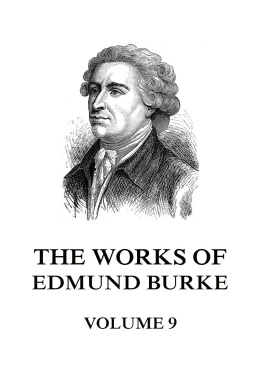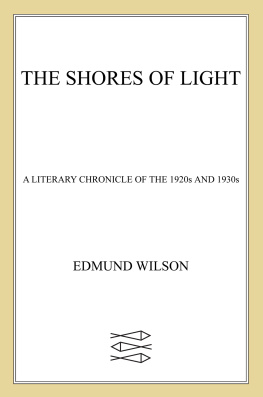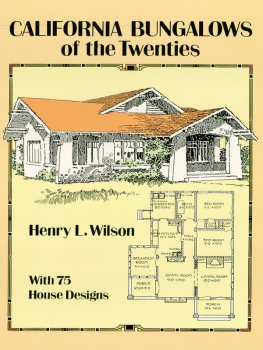Edmund Wilson - The Twenties
Here you can read online Edmund Wilson - The Twenties full text of the book (entire story) in english for free. Download pdf and epub, get meaning, cover and reviews about this ebook. year: 2019, publisher: Farrar, Straus and Giroux, genre: Non-fiction. Description of the work, (preface) as well as reviews are available. Best literature library LitArk.com created for fans of good reading and offers a wide selection of genres:
Romance novel
Science fiction
Adventure
Detective
Science
History
Home and family
Prose
Art
Politics
Computer
Non-fiction
Religion
Business
Children
Humor
Choose a favorite category and find really read worthwhile books. Enjoy immersion in the world of imagination, feel the emotions of the characters or learn something new for yourself, make an fascinating discovery.
- Book:The Twenties
- Author:
- Publisher:Farrar, Straus and Giroux
- Genre:
- Year:2019
- Rating:5 / 5
- Favourites:Add to favourites
- Your mark:
- 100
- 1
- 2
- 3
- 4
- 5
The Twenties: summary, description and annotation
We offer to read an annotation, description, summary or preface (depends on what the author of the book "The Twenties" wrote himself). If you haven't found the necessary information about the book — write in the comments, we will try to find it.
The Twenties — read online for free the complete book (whole text) full work
Below is the text of the book, divided by pages. System saving the place of the last page read, allows you to conveniently read the book "The Twenties" online for free, without having to search again every time where you left off. Put a bookmark, and you can go to the page where you finished reading at any time.
Font size:
Interval:
Bookmark:

When the life of the mind meets the life of the groin plenty of laughs can be counted on all round.
front page review,
The New York Times Book Review
EDMUND WILSON
THE TWENTIES
The passionate and imaginative record of a tumultuous young manhood
Edited with an introduction by LEON EDEL
From Notebooks and Diaries of the Period
Edited with an Introduction by

Farrar, Straus & Giroux
The author and publisher have provided this e-book to you for your personal use only. You may not make this e-book publicly available in any way. Copyright infringement is against the law. If you believe the copy of this e-book you are reading infringes on the authors copyright, please notify the publisher at: http://us.macmillanusa.com/piracy.
Edmund Wilson was working on The Twenties at the time of his death in 1972. He had assembled the greater part out of old notebooks of the time and inserted certain passages of memory which gave the book an autobiographical cast, like his Prelude of 1967 and his Upstate of 1971. These volumes, also derived from old notebooks and diaries, had covered early and late experiences. He now wished to fill in the intervening decades.
Since he did not live to complete the book, it lacks the full personal gloss of his earlier volumes. His instructions were that he should be edited with a light hand. I have filled in such historical information as might be useful, and Edmunds correspondence has thrown light on specific passages. The notes speak for themselves, in their fragmented yet often piercing glimpses of the decade in which they were written; they provide perhaps the largest authentic document of the time, the observations of one of the principal actors in the American twenties. Edmund gives a good deal of the grim side, the rawness of America with its increasing industrialization and its laying waste of national treasures, the mad side of Hollywood, the literary in-fighting in New York, the gossip and anecdotes of his peers; we meet Scott Fitzgerald, Edna Millay and John Peale Bishop; there are vignettes of Mencken and Dorothy Parker; we hear the voices of E. E. Cummings and Dos Passos and encounter Eugene ONeill and the earlier artist life of Cape Cod. Nowhere have we had a picture less varnished and so rich in focused detail. Some of the material was used by Edmund in various booksfor these were Edmunds working notebooks. Readers may recognize passages which served in I Thought of Daisy and Memoirs of Hecate County. Where possible I give brief indication of this, but Edmund used and reused his materials in so many cunning ways, always revising, that the full study may be left to future textual scholars.
In a letter to his publisher, Roger Straus, Edmund wrote long ago that he wanted his editor to correct and clean up his text. If I dont live to edit the whole thing myself, it will have to be done by my literary executor, and here I want to put it on record that if he is dealing with the handwritten volumes that I shouldnt have got around to having typed, I dont want him to have them published in the strictly scholarly way that is getting to be the academic fashion. That is, I dont want him to reproduce my contractions and ampersands, misspellings and faulty punctuations. If words have been dropped out, they should be supplied in brackets. They ought, from this point of view, to be made as readable as possible. In reviewing Hemingways Islands in the Sun, he also spoke of this problem. The author is not to be charged with the defects of manuscripts which he did not choose to publish and for which he can now take no responsibility, nor his editors with making those works more coherent, if the editing has been done with good judgment.
I take as my principal guide the injunction to make the notebooks as readable as possible. I have been aided by the memory of certain conversations with Edmund even before I knew he intended me to be the editor of his posthumous papers.
Wilsons notebooks, deposited in the Beinecke Library at Yale, comprise 2,125 manuscript pages, in forty-one stout ledger-type copybooks. There are also miscellaneous pages. Edmund wrote indiscriminately in pencil and ink. He is at times almost illegible; but he also often writes the neat careful hand which most of his correspondents know. When he is very legible, we may assume that he is transcribing from rough notes taken sur le vif. His note-taking habit may explain the minutiae of his descriptions; he was remarkably visual, he saw much more than most persons, and he did not like to rely only on memory.
In the notebooks we meet for the first time the distinctively personal Edmund Wilson. There is the sentience behind the curious critical eye, the passion behind cool statementa passion packed into hard intelligence. We discover how much Edmund used his eyes, his nose, his ears, his sense of smell, and he reveals always the tone of his mind. Wilsons interest in notebook-keeping was an artists interest in himself and his world; the notebooks are often the equivalent of a painters sketchbook and as such are the intermittent record of a constant onlooker and an adventurous mind. He grasps at evanescent bits of life; he wants to hold on to them before they disappear. He picks up anecdotes and jokes; he deals both with profundities and inanities; there are uncanny phonetic renderings of the slidings and elisions of American speech. He has a faultless ear. He is attentive to the dress of women, their jewels, their undergarmentsthere is quite a bit of beddingand the self is portrayed in undress with the same care as when the slight young man in Greenwich Village sallied forth to parties in matching ties and socks.
Edmund had drafted a prefatory note to The Twenties. I give it in its entirety, for it suggests his awareness of the personal way in which he looked at people and events, his sense of his fallibility, and his doubts about publishing obsolete or redundant passages because they had meaning for him, if not for his potential readers. I dont want to cut any corners, he once explained to me, and when I replied, Theyre your own corners, he still demurred. Drastic reviser of his earlier published work, he came at times, in old age, to feel some diffidence about letting go of the past embodied in his old notes. Here is the prefatory note:
This volume has been compiled from my notebooks and diaries of the period. I have had, in connection with it, a special kind of problem. On the one hand, I have wanted to supply documentation on myself by including material relevant to my emotions and ideas in my youth; and, on the other, not to let myself down by publishing inferior material. My poetry comes under the latter head. My only advice to the reader is to skip any verse that he sees coming. Another warning that I ought to give the reader is that my reports are probably to some extent unfair, because it is always easier to tell about the ineptitudes and absurdities of other people than it is about similar occurrences on the part of oneself. The reader should make allowances for this and not allow me to give the impression that everyone else was gauche or ridiculous. It is difficulteven in a novel that is told in the first personto put oneself in the wrong. The proper names are sometimes substitutions. The book will be more easily understood if one has read
Font size:
Interval:
Bookmark:
Similar books «The Twenties»
Look at similar books to The Twenties. We have selected literature similar in name and meaning in the hope of providing readers with more options to find new, interesting, not yet read works.
Discussion, reviews of the book The Twenties and just readers' own opinions. Leave your comments, write what you think about the work, its meaning or the main characters. Specify what exactly you liked and what you didn't like, and why you think so.

